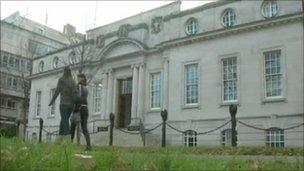Pledge to clean up 'toxic' University of Wales
- Published

The University of Wales has not commented on the scam allegations
The University of Wales (UoW) has become a "tarnished brand" but should keep its name, its vice-chancellor has said.
Prof Medwin Hughes said he wanted to repair it and not ditch it.
Five universities said they were "appalled" after BBC Wales exposed a scam in which overseas students are offered help to cheat their way to UoW-validated degrees and visas.
They said it no longer had the right to use the UoW name.
The vice-chancellors of Aberystwyth, Cardiff, Bangor, Glamorgan and Swansea universities - which are not members of the UoW - have put pressure on the UoW, saying they will not accept it in its current form.
They added that its activities are damaging the reputation of higher education in Wales as a whole, while Bangor University's vice-chancellor Prof John Hughes revealed his institution had lost business over the UoW's "toxic brand".
'Strong brands'
Senior Plaid Cymru politician Dafydd Elis-Thomas, who is president of Bangor University, has backed their calls and has written to Education Minister Leighton Andrews, calling for the abolition of the University of Wales title as soon as possible.
But Prof Medwin Hughes told BBC Radio Wales: "I'm committed to cleaning up that brand. It's tarnished, yes, but under that tarnish there's a very good silver."
He said Wales needed "strong brands" and that he had a duty to the "thousands and thousands" of students who had University of Wales degrees to keep the name.
"My role as vice-chancellor is to deliver higher standards," he said.
He also suggested that other universities should look into their own validation activities.
Revelations
When asked what the issues raised by the investigation into UoW-validated degrees had to do with other institutions, he said: "I hear from my colleagues that the measured view is that the name University of Wales is no longer fit for purpose and they were appalled about the issues linked to validation.
"My comment is that these institutions are currently receiving also substantial money for being involved in these activities."
Prof John Hughes said Bangor University had already been adversely affected by revelations about the UoW.
He told Radio Wales international partners were confused and some wanted to stop working with it, even though Bangor does not come under the UoW umbrella.
'Dysfunctional'
Prof Richard B. Davies, Swansea University vice-chancellor, said it welcomed the merger of UoW with Trinity Saint David and Swansea Metropolitan University, which was announceed on Monday.
"However, this new institution cannot and should not be called the University of Wales," he said.
"It does not represent higher education in Wales, it does not represent Welsh higher education abroad, and it will comprise of only two relatively small institutions in the Swansea hinterland.
The vice-chancellors of Aberystwyth, Bangor, Cardiff, Glamorgan and Swansea, who are known as the St David's Day Group, said: "The changes announced this week by the University of Wales represent a fundamental change to the university's mission and the institution now needs a new title which reflects this considerably changed role - we are no longer able to accept it as the University of Wales."
Lord Elis-Thomas added: "As the president of Bangor University since 2001, a former staff member, researcher, and a graduate and post-graduate student of that establishment, I'd be ready to argue that the University of Wales, in terms of academic administration and the system of validating degrees and diplomas that I was both teaching and studying, have been dysfunctional since the 1970's."
'Transformational change'
In a statement, the Welsh government said Education Minister Leighton Andrews was "disturbed by the continuing adverse publicity attached to the University of Wales".
UoW's chancellor Prince Charles is also being kept informed, Clarence House said.
The UK Border Agency is carrying out an investigation into the latest allegations about University of Wales-validated qualifications.
Overseas students were offered the opportunity to cheat their way to degrees and visas.
Two staff at Rayat London College have been suspended and the registrar, Irvin Harris, has resigned.
On Thursday, it was also announced that Mr Harris had resigned as chief executive of the exam board PQM.
He said he did so to "protect the good name" of the company and that he believed he would "be exonerated from any wrongdoing".
The college has informed the police and dissociated itself from any alleged wrongdoing.
UoW would not comment on the scam allegations.
'Small university'
The revelations came after the university, an institution since 1893, announced it would stop validating courses at all other institutions in the UK and abroad.
It means what is currently the second largest university in the UK, with 70,000 students on its courses in 130 colleges worldwide, will become one of the smallest in Wales from next September.
It will now have just two small universities in south west Wales - Swansea Metropolitan University and Trinity Saint David.
A Welsh government spokesperson said the education minister was "mindful of the conclusions" of the McCormick Review in respect of the University of Wales.
The review said the university needed to change radically and had become dependant on income from validating courses in colleges overseas.
Week In Week Out: Cash For Qualifications was broadcast on BBC One Wales on Wednesday 5 October at 20:30 BST. It can be viewed on the BBC iPlayer.
- Published6 October 2011
- Published5 October 2011
- Published6 October 2011
- Published5 October 2011
- Published5 October 2011
- Published4 October 2011
- Published3 October 2011
- Published22 June 2011
- Published6 July 2011